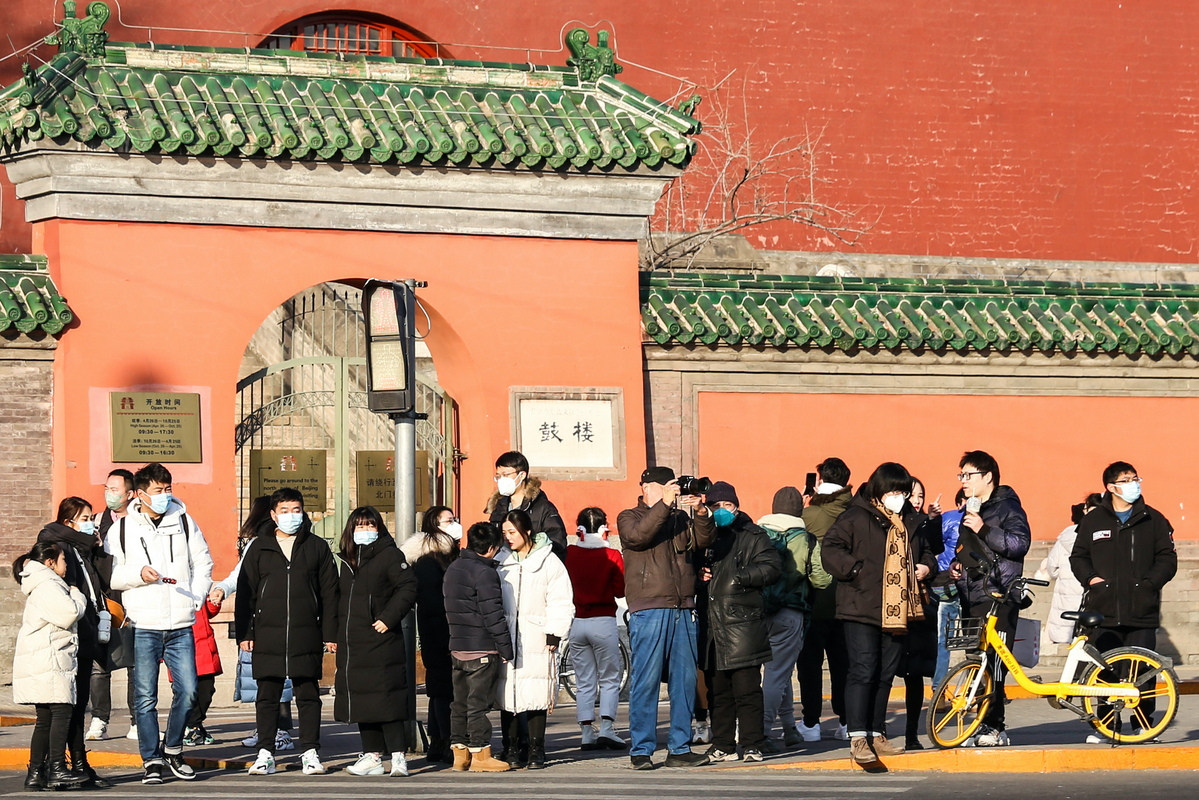Confidence mounts for economic growth
People take photos in front of Gulou, or the Drum Tower, in Beijing, Jan 1, 2023. [Photo by Wu Xiaohui/chinadaily.com.cn]
Activity picks up as nation optimizes COVID-19 control measures
Hopes are rising that the Chinese economy can make a strong recovery and lead the way for the global economy as the world faces challenges on a number of fronts this year.
Economists have warned that a potential global economic recession is looming as tighter financial conditions weigh on demand while geopolitical tensions linger. According to the International Monetary Fund, "the worst is yet to come", as global growth is forecast to further weaken in 2023.
However, economic activity has shown signs of picking up in China as the nation pursues a smooth transition in its phased response to COVID-19.
For example, according to market tracker Wind Info, 6,316 domestic flights took to the skies on Dec 26, almost double the number a month ago, while the previous day, movie box office takings nationwide rose to 106.17 million yuan ($15.39 million), up from 14.47 million yuan a month earlier.
These positive signs have persuaded a growing number of international investment banks and asset managers to the view that a substantial economic rebound will unfold in China. The rebound will be underpinned by three key factors — a rally in domestic consumption due to reduced COVID-19 disruptions, improving confidence in the property and private sectors, and stepped-up macroeconomic policy adjustments.
Kristina Hooper, chief global market strategist at Invesco, a global investment management company, said optimized COVID-19 containment and measures to stabilize the property sector "could help propel China to be a key growth engine in 2023".
The tone-setting Central Economic Work Conference, held in the middle of last month, prioritized increasing domestic demand by boosting consumption to promote economic growth amid pressure from "demand contraction, supply shocks and weakening expectations".
The meeting stressed the need for better coordination of epidemic prevention and control measures with economic and social development, and called for efforts to optimize response to the epidemic.
Officials and experts said consumer spending will rebound, as reduced disruption from COVID-19 is expected to release pent-up demand, which will be seen after the first quarter and be a key driver for economic recovery this year.
Yin Yanlin, deputy director of the office of the Central Committee for Financial and Economic Affairs, said the optimization of COVID-19 containment measures will create favorable conditions for economic recovery.
"The worst moment is over. With the implementation of optimized COVID containment measures, (China will see) a smoother flow of people and logistics, and accelerated recovery in business and social activities," Yin told a recent forum.
The World Bank said in its latest China Economic Update that consumer confidence is expected to improve as pent-up demand is released after the first quarter.
China has stepped up optimization of COVID-19 controls since November and will scrap the quarantine requirement for international arrivals from Sunday. It has also changed the name of the disease from "novel coronavirus pneumonia" to "novel coronavirus infection".
Hu Yifan, regional chief investment officer and head of macroeconomics for Asia-Pacific at UBS Global Wealth Management, said the Swiss wealth manager forecasts that China's year-on-year retail sales growth may rally from about 1 percent last year to at least 5 percent this year as economic activity returns to normal from COVID-19 and creates more offline consumption.
A consumption rebound may contribute to more than half the nation's economic growth this year, which could rise to about 5 percent year-on-year, up from about 3 percent last year, Hu said.
Investment growth is expected to remain robust this year thanks to infrastructure construction supported by high-speed railway projects, manufacturing investment driven by high-tech sectors, and a narrower slide in real estate development investment, Hu said.
She said such a recovery in domestic demand will likely help offset downward economic pressure from slowing exports amid weakening global demand.
Data from the National Bureau of Statistics, or NBS, show that China's exports rose by 11.9 percent year-on-year to 21.83 trillion yuan from January to November, but single-month growth for November fell to 0.9 percent, pointing to the downside risk facing exports as global growth slows.
Experts said this situation underscores the significance of increasing policy support to ensure a sound rebound in domestic demand, especially as the consumption recovery still faces hurdles such as rising unemployment.
The NBS said China's surveyed urban jobless rate stood at 5.7 percent in November, up by 0.2 of a percentage point from October. The rate among those in the 16 to 24 age group was 17.1 percent.
 |
Photos
Related Stories
Copyright © 2023 People's Daily Online. All Rights Reserved.










